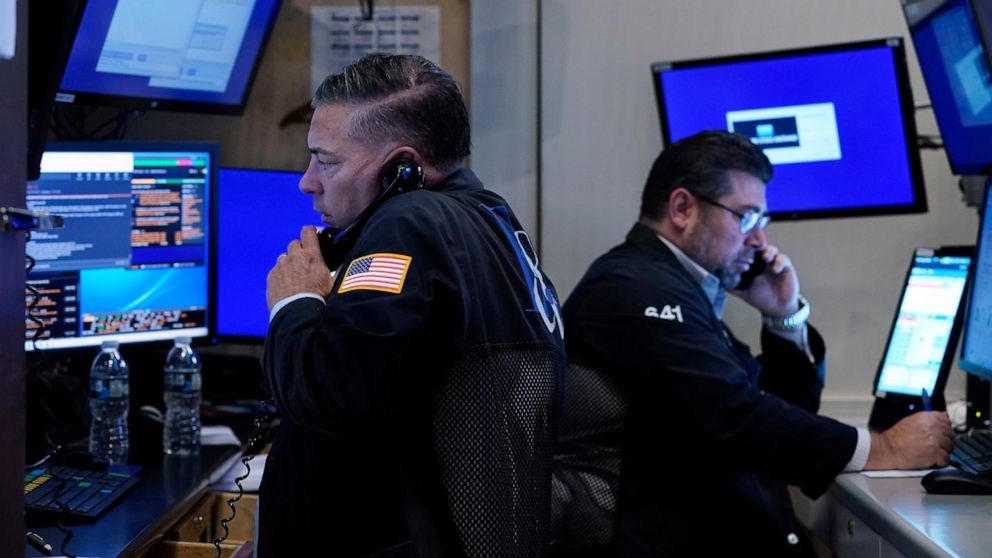World shares, US futures slip on worries over omicron risks
World markets and U.S. futures have fallen as investors cautiously weigh how much damage the new omicron coronavirus variant may unleash on the global economy
TOKYO — Global shares mostly slipped Tuesday as investors cautiously weighed how much damage the new omicron coronavirus variant may unleash on the global economy.
France’s CAC 40 slipped 1.4% in early trading to 6,684.44, while Germany’s DAX lost 1.1% to 15,105.99. Britain’s FTSE 100 shed 1.2% to 7,024.58. U.S. shares were set for a bleak open, with the future contract for the Dow industrials down 1.2% at 34,675.00. The S&P 500 future fell 1.4% to 4,612.00.
Singapore led Asia’s losses, dropping 2.5%, while South Korea’s Kospi lost 2.4% to 2,839.01. Japan’s benchmark Nikkei 225 closed 1.6% lower at 27,821.76, as pessimism over the omicron variant set in. Australia’s S&P/ASX 200 gained 0.2% to 7,256.00. Hong Kong’s Hang Seng dipped 1.6% to 23,475.26, while the Shanghai Composite was nearly flat at 3,563.89.
Some analysts think a serious economic downturn, like what happened last year, likely will be averted because many people have been vaccinated. But they also think a return to pre-pandemic levels of economic activity, especially in tourism, has been dramatically delayed.
“Sentiments may ride on the positive handover from Wall Street overnight, but with the slower vaccination rate and more limited healthcare capacity in the region, uncertainty from the new omicron variant may seem to bring about higher economic risks for the region at a time where it is shifting towards further reopening,” Yeap Jun Rong, market strategist at IG in Singapore, said of the omicron’s impact on Asia.
The vaccination rollout rate varies by country in the region, at about 77% in Japan, 50% in Vietnam and 35% in Indonesia. In Asia, the omicron variant has been detected in Australia, Japan and Hong Kong, and the region is bracing for more cases. It is unclear how effective current vaccines may be against the new variant.
Omicron adds more risk to a global economy already contending with paralyzing uncertainty. The variant appears to spread more easily, and countries around the world have put up barriers to travel in hopes of stemming it.
Travel bans, including decisions by Japan and Israel to bar foreign visitors, threaten to disrupt global business. Global supply chains already gummed up by bottlenecks could be further ensnarled if outbreaks shut down factories, ports and freight yards.
Shipping problems would risk pushing prices higher, adding to inflation pressures. In response, the world’s central banks could raise interest rates and imperil the recovery from last year’s brief but intense coronavirus recession.
China’s manufacturing activity rebounded in November as orders improved and power shortages eased, according to a survey by an industry group and the national statistics agency.
The survey found that a monthly purchasing managers’ index rose to 50.1 from October’s 49.2 on a 100-point scale. The index spent the previous two months below 50, showing decreasing activity. A measure of production rose 3.6 points to 52, reflecting a recovery from power rationing imposed in major manufacturing areas in September.
Besides waiting on more clues about how much economic damage omicron will ultimately do, the market has several big mileposts this week that could swing prices. The headliner is likely Friday’s U.S. jobs report, where economists expect to see an acceleration in hiring by employers during November.
In energy trading, benchmark U.S. crude dropped $1.74 to $68.21 a barrel. It rose $1.80 to $69.95 per barrel on Monday. Brent crude, the international standard, fell $1.82 to $71.62 a barrel.
In currency trading, the U.S. dollar slipped to 112.86 Japanese yen from 113.56 yen. The euro advanced to $1.1365 from $1.1293.
![]()


